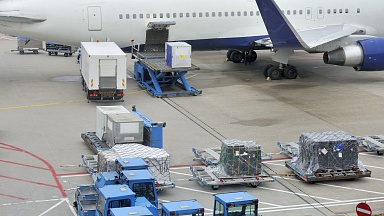A critical lack of ocean containers and capacity for ex-China exports, together with vessel schedule disruption, are continuing to drive modal shift to air that is adding to a squeeze on air freight capacity already stretched by buoyant demand generated by COVID vaccine transport, PPE and the B2C e-commerce boom, according to a leading air charter broker.
«Currently, we are seeing that the problems in ocean freight are putting a lot of pressure on air capacity. We are booking big charter series in all directions at the moment, some of this with commodities, for example, raw materials, which are not traditional charter commodities,» Air Partner’s Singapore-based director for freight and VP for Asia Pacific, Mike Hill, told Lloyd’s Loading List in an interview.
«Air freight rates dropped a little after Christmas but remain very high compared to market behaviour in previous years.»
He added that COVID vaccine transport was creating «an extra squeeze in capacity, with a large number of enquiries and bookings going on at the moment — mostly ex-Asia to Europe or to the US.»
Brexit uncertainty
As to the air cargo charter market being called upon by shippers to provide lift in response to delays to supply chains due to the new post-Brexit trading landscape, Hill noted that this is «yet to develop», largely due to the stockpiling of goods which took place before the end of the Transition Period.
«However, let’s see what the next two weeks bring. The ‘Brexit situation’ can change at any minute and we are ready (with solutions) if the need arises. We are fielding a lot of questions from concerned UK logistics companies about customs which our ‘specially-for-Brexit’ qualified customs staff in the UK are dealing with and are providing a customs service for clients wanting to export cargo ex-UK.»
Easing this week
Another leading air charter broker, Air Charter Service (ACS) Group, which reported spectacular growth in cargo flight bookings in December as shippers turned to air freight to preserve the supply chains for vital goods from Brexit-related disruption and congestion at UK and EU ports, highlighted an easing of demand in the week following the new year largely due to the fact that a no-deal (Brexit) had been avoided.
«There are some areas where rates are actually dropping as the general volume of cargo being transported has reduced compared with the pre-Christmas peak season,» explained ACS’ cargo director Dan Morgan-Evans.
«However, we are seeing an increase in demand already as pressure begins to build on supply chains dealing with the additional bureaucracy and disruption created by the COVID-related lockdowns.»
He played down the impact the distribution of COVID vaccines between Europe and the UK, within mainland Europe and elsewhere in the world, is likely to have on air cargo charter capacity.
«We don’t feel the volume of vaccines needing to be transported by air is going to have a large effect on capacity, at least initially. We believe the most challenging logistical element of vaccine distribution will be ground transport.»



